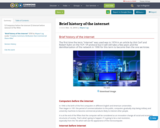
1) Computers before the internet
2) Internet before internet
3) The Web
- Subject:
- Applied Science
- Computer Science
- Material Type:
- Primary Source
- Date Added:
- 10/18/2018

1) Computers before the internet
2) Internet before internet
3) The Web
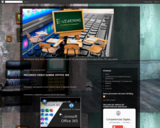
BLOG DE COMPETENCIAS DIGITALES PARA EDUCACIÓN EN LÍNEA

6.858 Computer Systems Security is a class about the design and implementation of secure computer systems. Lectures cover threat models, attacks that compromise security, and techniques for achieving security, based on recent research papers. Topics include operating system (OS) security, capabilities, information flow control, language security, network protocols, hardware security, and security in web applications.

In which John Green previews the new Crash Course on Navigating Digital Information! We've partnered with MediaWise, The Poynter Institute, and The Stanford History Education Group to teach a course in hands-on skills to evaluate the information you read online. The internet is full of information, a lot of it notably wrong. We're here to arm you with the skills to separate the good stuff from the inaccurate stuff and browse the internet with confidence.
Special thanks to our partners from MediaWise who helped create this series:
The Poynter Institute
The Stanford History Education Group (sheg.stanford.edu)
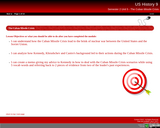
This is a module that implores students to think from an historical perspective about the Cuban Missile Crisis and create a memo of advice for President Kennedy on which action he should take.
Lesson Objectives or what you should be able to do after you have completed the module:
I can understand how the Cuban Missile Crisis lead to the brink of nuclear war between the United States and the Soviet Union.
I can analyze how Kennedy, Khrushchev and Castro's background led to their actions during the Cuban Missile Crisis.
I can create a memo giving my advice to Kennedy in how to deal with the Cuban Missile Crisis scenarios while using 5 vocab words and referring back to 2 pieces of evidence from two of the leader's past experiences.

The goal of this course is to review grammar and develop vocabulary building strategies to refine oral and written expression. Speaking and writing assignments are designed to expand communicative competence. Assignments are based on models and materials drawn from contemporary media (newspapers and magazines, television, Web). The models, materials, topics and assignments vary from semester to semester.
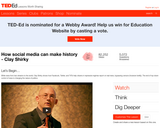
While news from Iran streams to the world, Clay Shirky shows how Facebook, Twitter and TXTs help citizens in repressive regimes to report on real news, bypassing censors (however briefly). The end of top-down control of news is changing the nature of politics. A quiz, thought provoking question, and links for further study are provided to create a lesson around the 20-minute video. Educators may use the platform to easily "Flip" or create their own lesson for use with their students of any age or level.

In virtually every industry and every firm, information technology is driving change, creating opportunities and challenges. Leaders who don't understand at least the fundamentals of information systems will be at a strategic disadvantage. This course provides broad coverage of technology concepts and trends underlying current and future developments in information technology, and fundamental principles for the effective use of computer-based information systems. There will be a special emphasis on manufacturing. Information Systems topics that will be covered include networks and distributed computing, including the World Wide Web, hardware and operating systems, software development tools and processes, relational databases, security and cryptography, enterprise applications, B2B, the semantic web and electronic commerce. Sloan LFM students with an interest in Information Systems are encouraged to register for this course.

The strategic importance of information technology is now widely accepted. It has also become increasingly clear that the identification of strategic applications alone does not result in success for an organization. A careful coordination of strategic applications, information technologies, and organizational structures must be made to attain success. This course addresses strategic, technological, and organizational connectivity issues to support effective and meaningful integration of information and systems. This course is especially relevant to those who wish to effectively exploit information technology and create new business processes and opportunities.
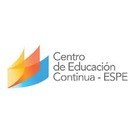
Artículo referene a: La Computación en la Nube en el proceso formativoen Programación Web
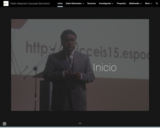
Este sitio web es de Pablo Alejandro Quezada Sarmiento
Docente - Instructor de la Universidad de las Fuerzas Armadas - ESPE -CEDMIL.

6.171 is a course for students who already have some programming and software engineering experience. The goal is to give students some experience in dealing with those challenges that are unique to Internet applications, such as:
concurrency;
unpredictable load;
security risks;
opportunity for wide-area distributed computing;
creating a reliable and stateful user experience on top of unreliable connections and stateless protocols;
extreme requirements and absurd development schedules;
requirements that change mid-way through a project, sometimes because of experience gained from testing with users;
user demands for a multi-modal interface.

This course on software engineering covers design and implementation of medium-scale software systems, using web applications as a platform. In the course, students learn the fundamentals of structuring a web application and writing modular code, with an emphasis on conceptual design to achieve clarity, simplicity, and modularity. Topics also include functional programming, relational databases, and security.
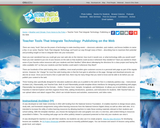
This article for elementary teachers focuses on three tools that allow educators to publish to the web for free - Instructional Architect, Filamentality, and TeacherTube. Design hotlists, webquests, scrapbooks, and upload video.
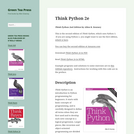
Think Python is an introduction to Python programming for beginners. It starts with basic concepts of programming, and is carefully designed to define all terms when they are first used and to develop each new concept in a logical progression. Larger pieces, like recursion and object-oriented programming are divided into a sequence of smaller steps and introduced over the course of several chapters.
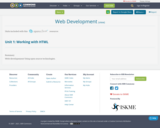
Web-developement Using open source technologies.
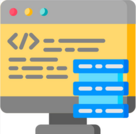
This resource contains the 7 units that are inside of quarter 1 of my Web Development I course at Mountain Heights Academy. This course was written to align Utah's Web Development I Standards (quarters 3 and 4 have not been written yet). Each unit provided takes up about a week. At the end of each unit, I assess my students with an assignment (provided) and quiz (not provided). At the end of the quarter, I assess my students with a midterm exam (not provided). In the first week of my course, I go over my syllabus and other class procedures.

This resource contains the 10 units that are inside of my quarter 2 of my Web Development I course at Mountain Heights Academy. This course was written to align Utah's Web Development I Standards (quarters 3 and 4 have not been written yet). Each unit provided takes up about a week. At the end of each unit, I assess my students with an assignment (provided) and quiz (not provided). At the end of the quarter, I assess my students with either a final exam (not provided) or a project (provided).

Kevin Allocca is YouTube's trends manager, and he has deep thoughts about silly web video. In this talk from TEDYouth, he shares the 4 reasons a video goes viral. A quiz, thought provoking question, and links for further study are provided to create a lesson around the 7-minute video. Educators may use the platform to easily "Flip" or create their own lesson for use with their students of any age or level.

Diversity begets creativity—in this seminar we tap the amazing power of swarm creativity on the Web by studying and working together as Collaborative Innovation Networks (COINs). As interdisciplinary teams of MIT management, SCAD design, University of Cologne informatics, and Aalto University software engineering students we will explore how to discover latest trends on the Web, and how to make them succeed in online social networks. We study a wide range of methods for predictive analytics (coolhunting) and online social marketing (coolfarming), mostly based on social network analysis and the emerging science of collaboration. Students will also learn to use our own unique MIT-developed Condor tool for Web mining, social network analysis, and trend prediction.